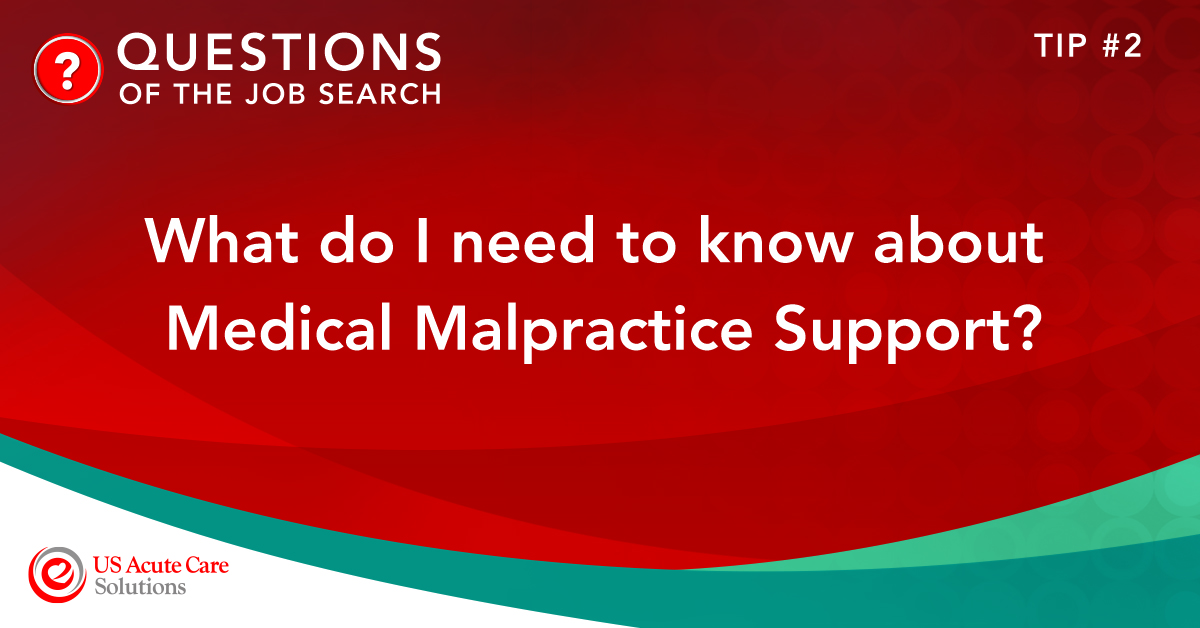Medical Malpractice Support
Medical Malpractice: The Issue
Physician wellness is a hot topic these days – in the news, on your Twitter feed, at conferences, and in journals. At USACS, we have a wellness committee intended to promote good health and increase job – and life – satisfaction.
Getting sued for malpractice is an experience that can lead to the opposite of wellness – especially for a physician’s mental health. In fact, malpractice litigation is associated with higher rates of burnout, anxiety, depression, even PTSD and suicide, according to Dusty Otwell, Vice President of Claims and Risk Management for USACS.
Emergency medicine is a high-risk specialty – clinicians are so frequently treating the very sickest and most severely injured of patients, thus leads to a lower mortality rate. Therefore, medical malpractice is a critical conversation in your job search. And we want to equip you to ask the right questions!
What to ask
We’ve developed a long list of all questions you should ask in a job search, but inquiries about medical malpractice may be among the most important.
Questions include:
- What type of Malpractice coverage do you offer?
- Who pays the tail?
- What are the limits of coverage?
- Can the insurance company settle without consent or input from the doctor?
- What is the company’s malpractice claims frequency?
- Are there any policies or programs for high risk clinical scenarios that decrease risk and increase patient safety?
- Is there a Litigation Stress Support Team?
What you need to know about US
This is an area in which USACS particularly shines. We use our national scale and bargaining power to provide clinicians with the best medical malpractice support in the business. Furthermore, our risk management and continuing education has resulted in our clinicians being sued at a rate of less than half of the national benchmark.
We credit this to first, the quality of our excellent leadership and clinicians, who receive continuing education and training each year. According to USACS Chief Medical Officer Dr. Amer Aldeen, USACS is at or near the terms of emergency medicine quality by most nationally collected metrics available, as demonstrated by researching the Clinical Emergency Data Registry (CEDR) of the American College of Emergency Physicians. We also rank very highly in operational metrics as measured by the Emergency Department Benchmarking Alliance (EDBA), whose vice president is the chair of our National Clinical Governance Board, Dr. James Augustine. Participation in these groups is voluntary, which suggests that they actually skew toward higher quality sites, as those are the ones more likely to share their data.
Secondly, we’ve worked diligently for decades to put processes in place that ultimately protect both our patients and our clinicians. Read on to learn how.
Our strategy
FailSafe
The USACS FailSafe program provides clinicians with 24/7 phone access to experienced senior physicians. This ensures our physicians are never alone in managing a potentially risky situation. FailSafe is available to all USACS clinicians and they are instructed when and how to use it, any time they need it. This “second opinion” hotline receives at least 12,000 phone calls each year. FailSafe gives those making life-or-death decisions the wisdom and confidence to move forward immediately.
Mandatory Education
As an organization, we pride ourselves in continuing education, staying current, advancing research, and following best practices. Owners in our physician-owned group invest in themselves by making sure they’re always at the top of their game. Courses are constantly offered – both online and on-campus – and our clinicians learn from each other. Our doctors also publish regularly and belong to professional fellowships, such as American College of Emergency Physicians (ACEP).
Even when…
As much as we hate lawsuits – and, of course, the event leading up to the suit, sometimes claims are inevitable. So when the most compliant medical risk management behaviors aren’t enough to prevent all malpractice claims, our risk management program ensures physicians receive immediate support, guidance and expert legal representation should they become targets of a lawsuit.
Closing Argument
In short, asking questions about what kind of medical malpractice support is available is a crucial element of your job search. You have worked so long and hard to get where you are, and we want to protect you. We have your back.

